Bringing a new puppy into your home is an exciting adventure! As a responsible pet owner, it’s important to ensure your furry friend stays healthy and happy.
Knowing which vaccinations your puppy needs and their costs can help you prepare for this important part of puppy care.
Vaccinations play a critical role in protecting your puppy from serious illnesses.
Understanding the essential shots can guide you in making informed decisions for your pup’s health and budget.
1) DHLPP Vaccine
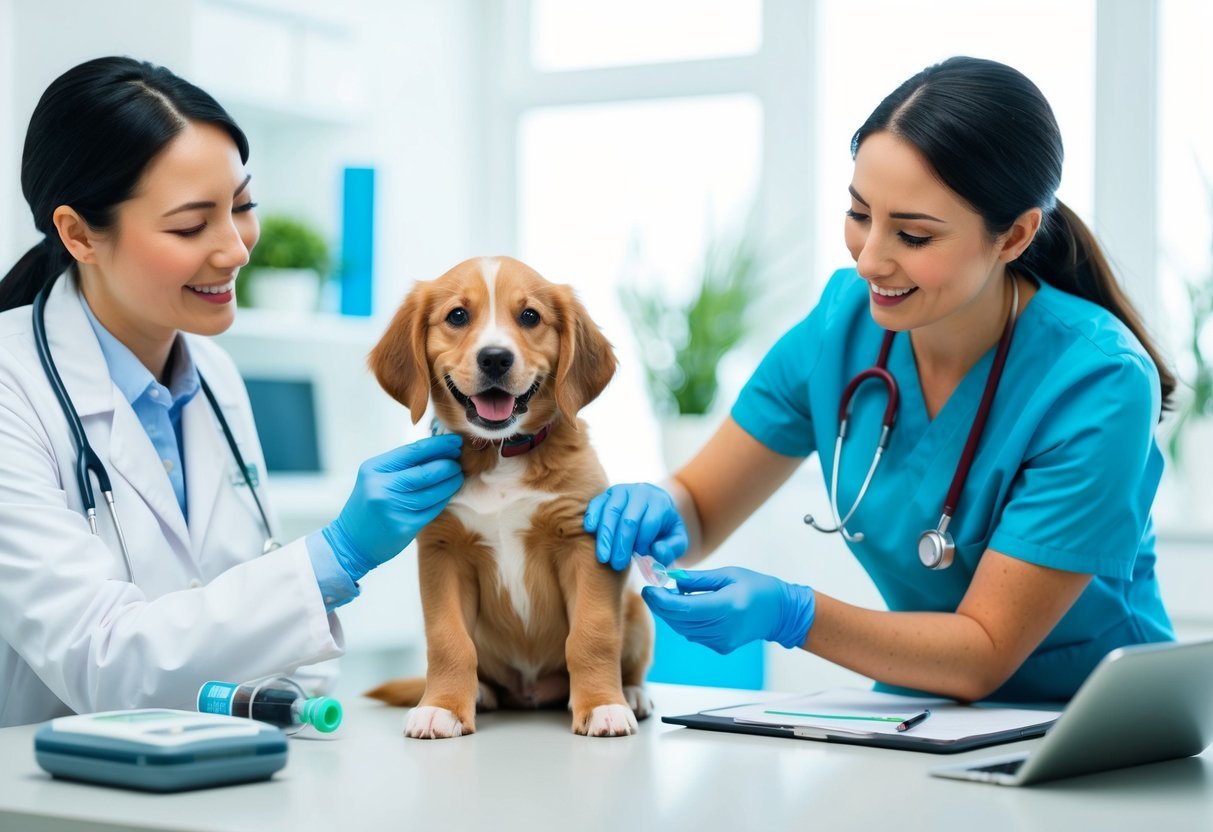
The DHLPP vaccine is important for your puppy’s health.
It protects against several serious diseases, including distemper, hepatitis, parvovirus, and leptospirosis.
You usually start the vaccination process when your puppy is between 8 and 10 weeks old.
The first shot is given, and then follow-up boosters occur at 11 to 13 weeks and again at 14 to 16 weeks.
After completing this series, your puppy will need a booster shot every three years.
Many vets recommend the DHLPP vaccine due to the illnesses it prevents.
These diseases can be very serious or even fatal.
By vaccinating your puppy, you’re helping to keep them safe and healthy.
While the vaccine is common, always talk to your veterinarian about your puppy’s specific needs.
They can give you the best advice on vaccination schedules and any potential risks.
The cost of the DHLPP vaccine can vary.
Typically, it ranges from $15 to $30 per shot.
This cost may change depending on your location and the vet clinic.
Investing in these vaccinations can save you a lot of trouble and vet bills down the road.
Rabies shot

The rabies vaccine is a must for your puppy.
This shot protects against a serious viral disease that can be fatal not just for dogs but also for humans.
Rabies is mainly spread through bites from infected animals.
Most states require puppies to get this shot by a certain age.
You’ll usually see it given when your pup is around 12 to 16 weeks old.
After the initial shot, a booster is needed one year later and then every one to three years, depending on local laws.
The cost of the rabies vaccination typically ranges from $15 to $30.
Some veterinary clinics may offer it at a lower price or even include it in wellness packages.
Checking with local animal shelters can also help you find affordable options.
Getting your puppy vaccinated is important for their health and the safety of your community.
Rabies is a serious disease, and vaccinating your pup is a simple step to keep them safe.
3) Bordetella Vaccine
The Bordetella vaccine is important for your puppy.
It helps protect against kennel cough, a common respiratory infection.
This disease spreads easily, especially in places where many dogs gather, like parks or boarding kennels.
You can get the Bordetella vaccine in two forms: injectable and intranasal.
The intranasal version goes into your puppy’s nose.
This can be less stressful for some dogs.
Consider your lifestyle when deciding on this vaccine.
If you plan to board your puppy or take them to doggy daycare, most facilities require it.
Even if you don’t plan on these activities, it can still be a good idea to protect your puppy from kennel cough.
The cost of the Bordetella vaccine varies.
Generally, it ranges from $25 to $60, depending on your location and the veterinarian.
Keeping up with the vaccinations is part of responsible pet ownership, helping your puppy stay healthy and happy.
4) Canine influenza vaccine
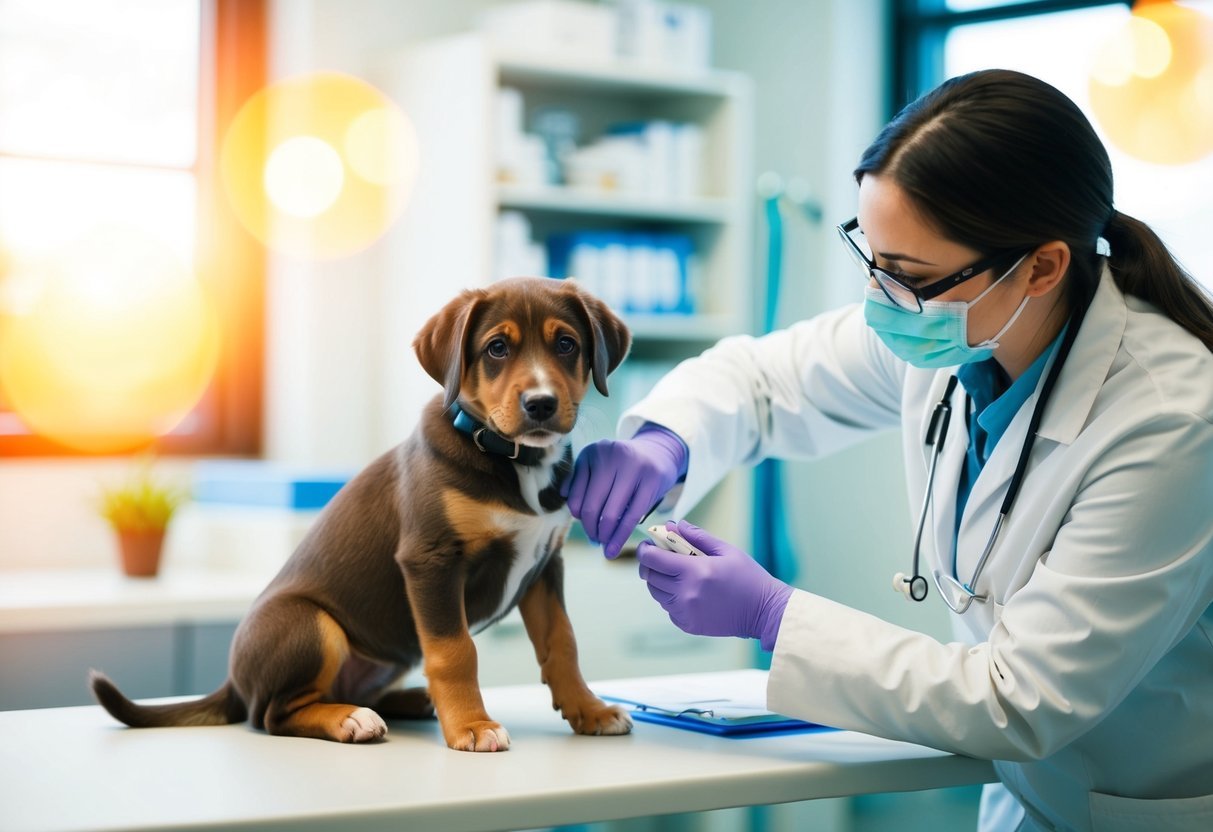
The canine influenza vaccine is important for keeping your puppy safe from dog flu.
This virus spreads easily, especially in places like dog parks and boarding facilities.
If you have an active puppy, this shot is worth considering.
Symptoms of canine influenza include coughing, a runny nose, and fatigue.
Some dogs may even develop a fever.
It can be serious, so vaccination helps reduce the risk.
The vaccine is usually given in two doses for puppies.
The first dose is given when your pup is around six to eight weeks old, and the second follows three weeks later.
After that, depending on your dog’s exposure, yearly boosters may be recommended.
Costs for the canine influenza vaccine can vary.
You can expect to pay between $25 to $50 for each dose, depending on your vet.
Even though it’s an added expense, protecting your puppy from illness is essential.
Make sure to discuss this vaccine with your vet, especially if your dog goes to social events or daycare.
Keeping your furry friend healthy and happy is always a priority!
5) Leptospirosis vaccine
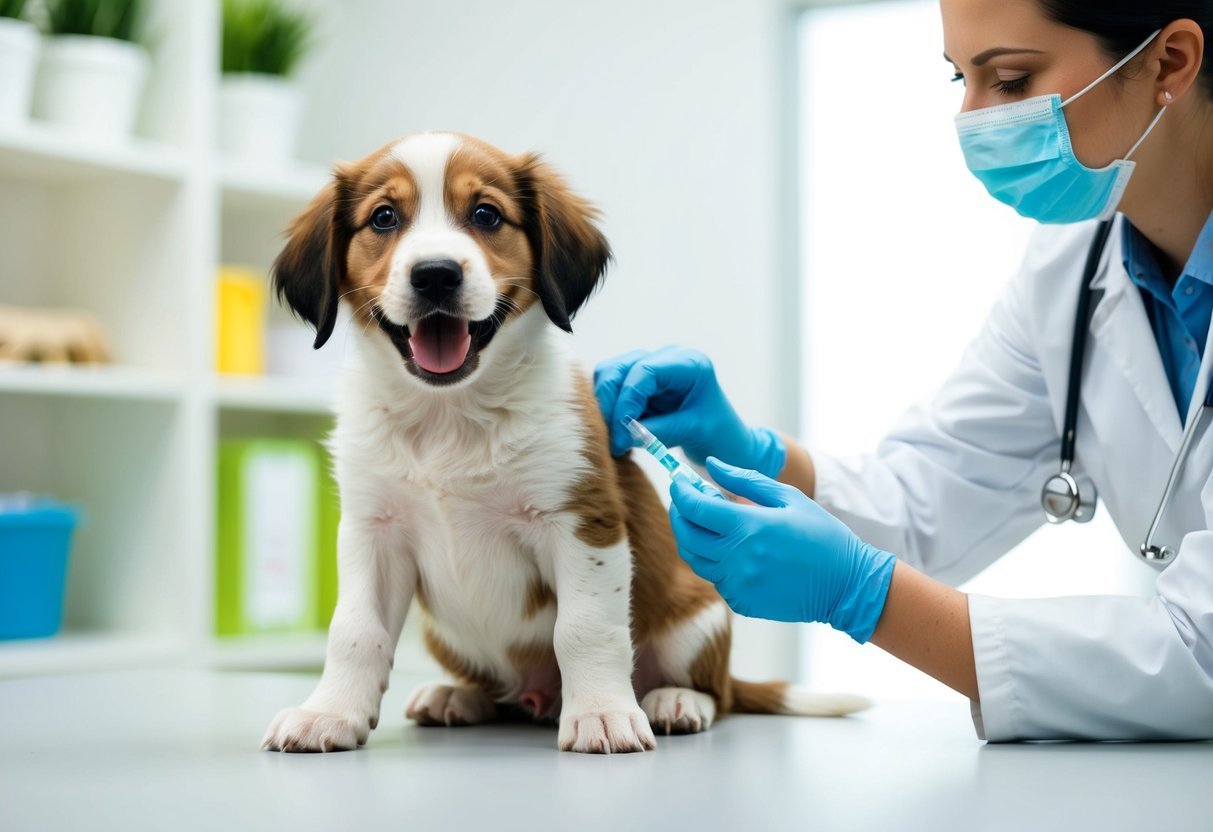
The leptospirosis vaccine helps protect your dog from a serious bacterial disease.
This illness can lead to kidney damage, liver failure, and even death if not treated.
Leptospirosis is often spread through contaminated water or soil.
If your dog spends time in wet areas or likes to explore puddles, this vaccine may be important for them.
In many places, vets now consider the leptospirosis vaccine as a core vaccine, especially in areas where the disease is common.
It’s good to discuss with your vet whether your puppy should get this shot.
The cost of the leptospirosis vaccine usually ranges from $20 to $50.
Prices can vary based on your location and the vet clinic.
Just like with any vaccine, watch for any side effects after your puppy is vaccinated.
Most dogs handle it well, but it’s smart to keep an eye on them.
With proper care, getting this vaccine can help keep your puppy healthy and happy.
6) Lyme disease vaccine

The Lyme disease vaccine protects your dog against Lyme borreliosis, a serious illness caused by ticks.
If you live in or visit areas known for Lyme disease, consider this vaccine.
Not all dogs need the Lyme vaccine.
If your furry friend stays away from tick-heavy areas, you might skip it.
Talk to your vet for the best advice based on your lifestyle.
Vaccination usually involves two shots in the first year, followed by a yearly booster.
The cost varies by location and vet, but you can expect to pay around $30 to $60 per dose.
Keep in mind the vaccine won’t eliminate the risk of Lyme disease, so regular tick prevention is important too.
Check your dog for ticks after walks, and use vet-recommended tick prevention products.
A Lyme disease vaccine can help keep your pup safe, especially if you’re in a high-risk area.
Always consult your veterinarian to determine what’s right for your dog’s health and lifestyle.
7) Parainfluenza vaccine
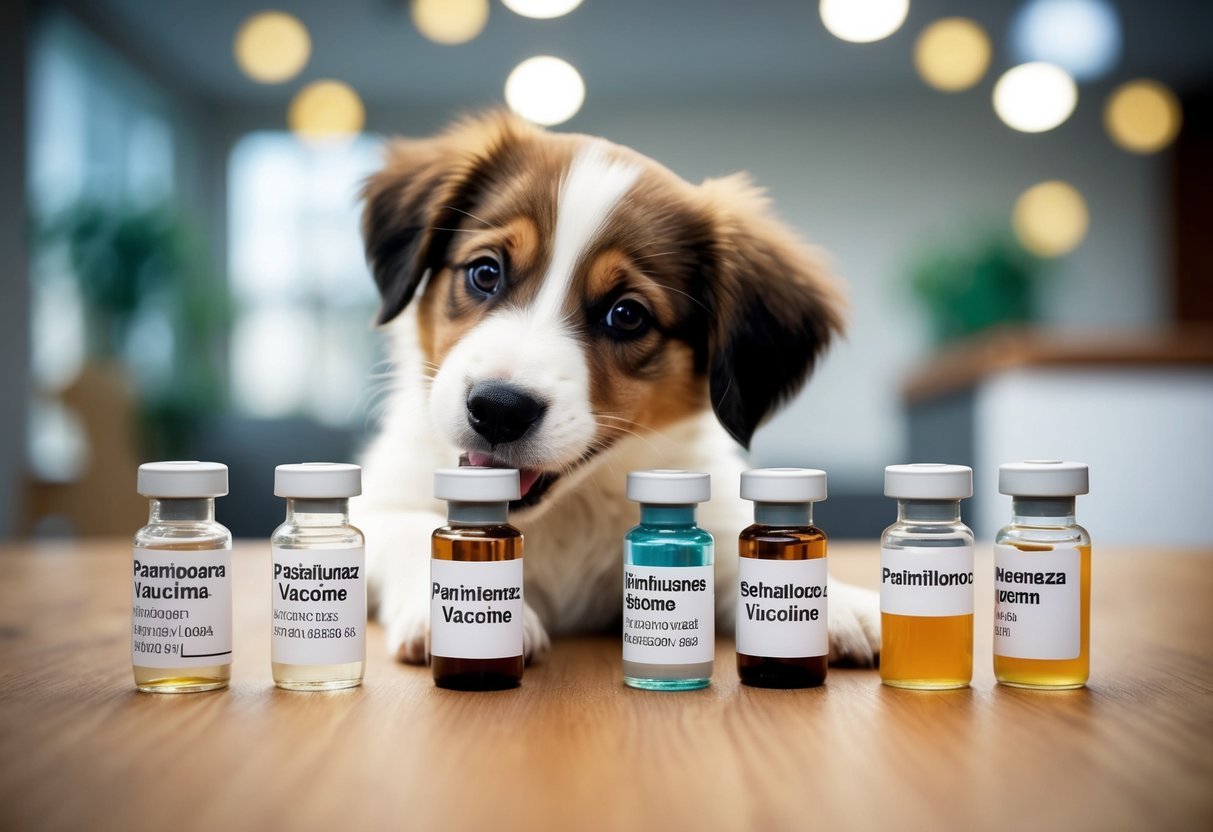
The parainfluenza vaccine protects your puppy from a virus that can cause respiratory illness.
This virus is part of a group that leads to kennel cough, a contagious disease.
You should start the vaccination when your puppy is between 6 and 8 weeks old.
It’s usually given in a series, with follow-up doses every 2 to 4 weeks until your pup is about 16 weeks old.
The cost of the parainfluenza vaccine can vary, but it’s often included in packages of vaccinations.
Talking to your vet can help you find the best options for your puppy.
Keep in mind that parainfluenza is considered a non-core vaccine.
This means it’s recommended mainly for puppies at higher risk, like those spending time in boarding facilities or dog parks.
Always consult with your vet about your puppy’s specific needs and vaccination schedule.
8) Parvovirus vaccine
The parvovirus vaccine is crucial for your puppy’s health.
This shot protects against a severe illness that affects the stomach and intestines.
It can be deadly, especially in young puppies.
Most puppies should start getting this vaccine between 6 to 8 weeks of age.
You’ll need to schedule several doses until they are about 4 months old.
This ensures they build a strong immunity to the virus.
Some vets recommend more doses if you live in areas with high risks of parvovirus.
Stay in touch with your vet about the right schedule for your puppy.
Vaccination costs can vary, but expect to pay between $15 to $30 per shot.
Some clinics offer a combination vaccine that includes parvovirus along with other important shots, which could save you some money.
By keeping up with the parvovirus vaccine, you help give your puppy a healthy start in life.
It’s an important step in keeping them safe from a serious disease.
Make sure you discuss this with your vet to stay informed about your puppy’s vaccination schedule.
Understanding Puppy Vaccinations
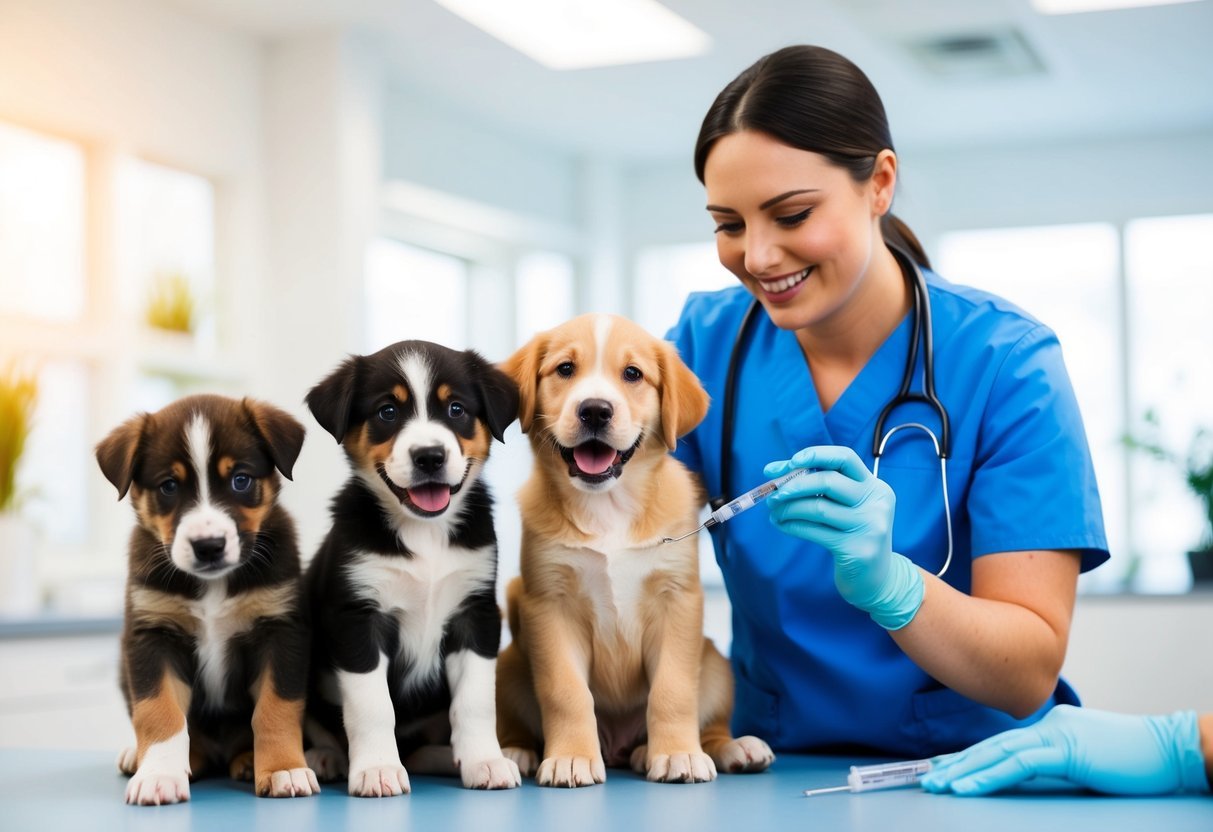
Vaccinations are a key part of keeping your puppy healthy.
They help protect against serious diseases that can affect their well-being.
Knowing why vaccinations are important and how they work will help you care for your furry friend.
Why Vaccinations Are Important
Vaccinations are vital for protecting your puppy from dangerous diseases.
These illnesses can be very serious and sometimes even fatal.
Common vaccines include those for parvovirus, distemper, and rabies.
- Parvovirus: Highly contagious and can lead to severe intestinal issues.
- Distemper: Affects the respiratory, gastrointestinal, and nervous systems.
- Rabies: A deadly virus that can infect both dogs and humans.
Puppies usually receive their first set of vaccinations at about six to eight weeks of age.
Keeping up with the vaccination schedule helps your puppy build immunity.
Missing vaccines can leave your puppy vulnerable to disease.
How Vaccinations Work
Vaccinations work by exposing your puppy to a harmless amount of the virus or bacteria.
This helps their immune system learn to fight off the illness without causing sickness.
When your puppy receives a vaccine:
- Immune Response: Their body recognizes the modified virus or bacteria.
- Antibody Production: The immune system creates antibodies to fight it.
- Memory Cells: Your puppy’s body remembers how to fight the disease in the future.
This process means that if your puppy is exposed to the real disease, their immune system can respond quickly.
Regular booster shots are also important.
They ensure continued protection as your puppy grows.
Planning Your Puppy’s Vaccination Schedule

Creating a vaccination schedule is key for your puppy’s health.
It ensures they get the necessary shots at the right times to build strong immunity against diseases.
Here’s how to get started.
When to Start Vaccinating
You should begin vaccinating your puppy between 6 to 8 weeks old.
This timing is crucial as it helps protect them from serious illnesses.
Puppies usually receive their first set of vaccines during this period.
Common initial vaccines include:
- Distemper
- Parvovirus
- Adenovirus (Hepatitis)
After the initial shots, follow-up vaccinations are given every 3 to 4 weeks until your puppy is at least 16 weeks old.
Some puppies in high-risk areas may need extra shots around 18 to 20 weeks.
Always consult your vet for tailored advice to your puppy’s needs.
Recommended Follow-Up Visits
Follow-up visits are essential to ensure your puppy remains protected.
After your puppy’s first series of shots, they will need booster shots.
Here’s a general timeline for follow-up vaccinations:
- 12 weeks: Second round of core vaccines.
- 16 weeks: Final core vaccines, including rabies.
Keep a record of vaccination dates and discuss with your vet about additional vaccines specific to your area or lifestyle, like the Bordetella vaccine for kennel cough.
Regular check-ups not only keep vaccinations on track but also help monitor your puppy’s growth and health.
Frequently Asked Questions

When it comes to your puppy’s vaccinations, it’s normal to have plenty of questions.
Here are some answers to help you navigate the vaccination process for your furry friend.
How much will I typically shell out for my pup’s vaccinations?
The cost of vaccinations can vary based on where you live and the specific vaccines your puppy needs.
Generally, you might expect to pay anywhere from $75 to $200 for the initial set of vaccinations.
Keep in mind that some clinics offer packages that can reduce costs.
Can you break down the pup shot timeline for me?
Puppies usually follow a specific vaccination schedule.
Initial shots typically start at around 6 to 8 weeks.
Boosters are given every 3 to 4 weeks until they reach about 16 weeks old.
Each vet might have slight variations, so it’s best to ask for a detailed schedule.
When’s the right time for my little buddy to get their first vaccines?
The first vaccines for your puppy should be given at 6 to 8 weeks old.
It’s crucial to start vaccinations early to protect against common diseases.
Always consult your vet to create the best timeline for your puppy.
What’s the real deal with the 5-in-1 shots for puppies?
The 5-in-1 shot, often called the DHLPP vaccine, protects your puppy from distemper, hepatitis, leptospirosis, parvovirus, and parainfluenza.
This combination shot is essential for your puppy’s health and is typically given in the early weeks of their life.
Which vaccines are an absolute must for my furry friend?
Your puppy should definitely get core vaccines like the DHLPP vaccine and the rabies shot.
Other important vaccines are Bordetella, Canine influenza, and Leptospirosis, especially if your dog will be around other animals or in certain environments.
How many rounds of shots does my pup need before they’re all set?
Most puppies need a series of vaccinations.
This is usually around 3 to 4 rounds to ensure their immunity is strong.
Always follow your vet’s guidance for the best protection for your puppy as they grow.

